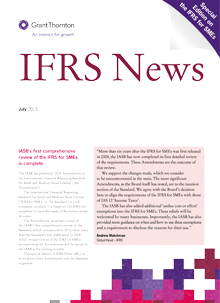In light of growing international interest and scrutiny of corporate practices we set out to explore how three major aspects of governance – the role of culture, board composition and strategic planning – are affecting businesses around the world.
Grant Thornton Taiwan is committed to providing high quality assurance services to help clients navigate the prevailing climate of tightening regulatory and...
-
Audit
At Grant Thornton, our IFRS advisers can help you navigate the complexity of financial reporting.
-
IFRS support
Our IFRS advisers can help you navigate the complexity of the Standards so you can focus your time and effort on running your business.
Related insights:


At Grant Thornton, tax is a key part of our organisation and our award-winning teams can offer you a range of solutions, whatever the size of your business or...
-
Transfer pricing
The laws surrounding transfer pricing are becoming ever more complex, as tax affairs of multinational companies are facing scrutiny from media, regulators and the public
-
Tax Audit
Our trusted teams can prepare corporate tax files and ruling requests, support you with deferrals, accounting procedures and legitimate tax benefits.
-
Tax Appeal
Our teams have in-depth knowledge of the relationship between domestic and international tax laws.
-
Advance Ruling
Through our global organisation of member firms, we support both companies and individuals, providing insightful solutions to minimise the tax burden for both parties.
-
Tax Treaty Benefits Application
Tax Treaty Benefits Application
-
FINI/FIDI Tax Services
Our solutions include dealing with emigration and tax mitigation on the income and capital growth of overseas assets.
-
Expatriate Income Tax Filing
Our team has extensive experience in helping expatriates in Taiwan to file personal income returns and claim tax refund where applicable. We file approximately 300 expatriate personal income tax returns in Taiwan annually.
At Grant Thornton, outsourcing represents more than US$250 million of our business. Whatever the size of your organisation or wherever you are in the world, we...
-
Bookkeeping
Effective bookkeeping and financial accounting are essential to the success of forward-thinking organisations. To get the optimum benefit from this part of your business, you'll need an experienced team behind you.
-
Inventory movement reporting
Outsourcing your operations and specific business functions to Grant Thornton can not only cut costs, but also bring new insights and experience to your business.
-
Payroll administration
Payroll and, in addition, personnel administration are the biggest and most time-consuming challenges facing expanding organisations. Grant Thornton’s outsourcing teams can manage these commitments on your behalf, allowing you to focus on what you do best – growing your business.
-
Trust account management
Running a transparent and trusted business means keeping shareholders, owners, management and other important stakeholders informed about key developments in your organisation.
-
VAT returns
At Grant Thornton, we understand the pressures management is under to achieve results, and for this reason we have developed systems for taking away the burden of compliance chores, leaving you to spend your time and energy on the core activities that ultimately lead to growth.
-
Head Office reporting
Businesses frequently outsource some of their daily operating tasks in order to focus their energy on their core competencies, while improving performance and lowering costs of their non-core activities. By saving time and money, Grant Thornton's outsourcing services allow clients to concentrate on what is really important to their business.
-
Executive Search
We understand that HR leaders need to focus on securing talents and this is no easy exercise. Our mission is to share best practices with our clients and help our clients to stay competitive in the market. Please do not hesitate to contact us to find out more about details of our services and how we can work together with you.
Global Mobility Services
-
Work Permit and Employment Gold Card Application Services
Work Permit and Employment Gold Card Application Services
-
Expatriate Tax
Expatriate Tax
As your business grows, our advisory services are designed to help you achieve your goals. Successful growth often means navigating a complex array of...
-
PRIMA Consulting Services
PRIMA Consulting Services
-
Business Operation Plan Composition
Business Operation Plan Composition
Grant Thornton Taiwan’s corporate secretarial advisors work directly with our in-house tax experts to help clients select and establish the best type of entity...
-
Setting up legal entities
With a global network of experts in their respective tax and regulatory environments, Grant Thornton advisors help individuals and corporations establish the type of business entity that will best position them to achieve their goals from the very start of their operations.
-
Liquidation and de-registration
Sometimes a business suffers an adverse event which impacts its ability to continue trading. And sometimes a solvent sale proves unsuccessful or a turnaround just isn't an option.
-
Update company statutory record
With a global network of experts in their respective tax and regulatory environments, Grant Thornton advisors help individuals and corporations establish the type of business entity that will best position them to achieve their goals from the very start of their operations.
mergers and acquisitions
-
Merger and Acquisition
Merger and Acquisition
Related insights:


Corporate governance
The tone from the top
Legal Services
-
Administrative remedies
Administrative remedies
-
Corporate legal consulting
Corporate legal consulting
-
Bankruptcy and restructuring
Bankruptcy and restructuring
-
Company dissolutions and liquidations
Company dissolutions and liquidations
-
Supplier and employee background investigations
Supplier and employee background investigations
-
Legal attest letter drafting service
Legal attest letter drafting service
-
Preparation and review of agreements in Chinese and English
Preparation and review of agreements in Chinese and English
-
Lifting restrictions on going abroad
Lifting restrictions on going abroad
-
Labor law compliance and labor-management negotiation
Labor law compliance and labor-management negotiation
-
Business and personal asset planning
Inheritance, inheritance tax, family business, and personal asset planning
Valuation Services
ESG & Sustainability
Our approach may at first appear similar to most executive search and selection companies; but what sets us apart is the ability to leverage the knowledge of...
Chemicals
Construction
Electronics
Financial institutions
Food manufacturing
Hotel, tourism and leisure
Information technology
Machinery
Manufacturing
Metals
Pharmaceuticals
Public Sector
-
Not for profit organizations
Not for profit organizations
-
Schools
Schools
-
Others
Others
Service Industry
Retail
Telecommunications
Textile
The International Financial Reporting Standard for Small and Medium Sized Entities ('IFRS for SMEs') is a self-contained standard. It is based on full IFRS but simplified to meet the needs of the entities within its scope.
The IASB has published '2015 Amendments to the International Financial Reporting Standard for Small and Medium Sized Entities'. These amendments are the outcome of the IASB's first comprehensive review of the requirements of the IFRS for SMEs, and are the only changes made to the Standard since it was initially published in 2009. The amendments that we believe will have the most significant impact are as follows:
- permitting the use of the revaluation method when accounting for property, plant and equipment
- aligning the basis of recognition and measurement for deferred income taxes with IAS 12 'Income Taxes'
- aligning how entities account for exploration and evaluation assets with the requirements of IFRS 6 'Exploration for and Evaluation of Mineral Resources'
This special edition of IFRS News tells you more about the IASB's Amendments and the IFRS for SMEs in general.
Also appears under...


